Search Results
Showing results 1 to 20 of 42
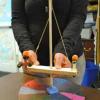
Carousel Pump
Source Institutions
In this activity, learners build a carousel toy that spins when pushed down.
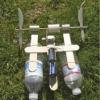
Electric Paddle Boat
Source Institutions
In this activity, learners build an electric two-paddle boat using paint paddles, plastic knives, and empty water bottles.
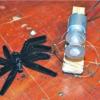
Creepy Crawlers
Source Institutions
Trick your family and friends with this creepy crawler that moves up and down. In this activity, learners construct a circuit and motor device that will move a homemade spider in a spooky way.
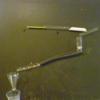
Magnetic Marble Run
Source Institutions
Learners explore magnetism and motion as they build a simple marble run. Learners test different arrangements of plastic and cardboard tubes, bottles, and cups on a magnetic board.
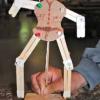
Lever Cowboy
Source Institutions
In this activity, learners build a figure that moves and "comes to life" when they pull its string.

Hand Spin Helicopter
Source Institutions
In this activity, learners build helicopters and launchers using wooden dowels and scrap paper. Use this activity to explore rotational motion and kinetic and potential energy.
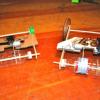
Bottle Cars
Source Institutions
In this activity, learners explore motion, energy, and electricity by constructing bottle cars that run on motors.
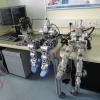
Exploring How Robots Move
Source Institutions
In this activity, learners explore how pneumatics and hydraulics could be used to produce movement in a robotic arm.

Construction Technologies: Construct the Strongest Bridge
Source Institutions
Learners work in pairs to create three simple types of bridges, a beam bridge, an arch bridge, and a suspension bridge.
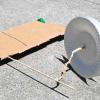
Rubber Band Racer
Source Institutions
In this activity, learners construct speedy vehicles made out of paper plates and powered by twisted rubber bands.
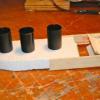
Paddle Boat
Source Institutions
In this activity, learners build an old-fashioned paddle boat out of simple materials.
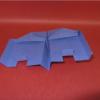
Glider
Source Institutions
In this activity, learners construct a paper glider to experiment with aerodynamic forces.
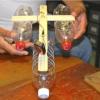
Speedboat
Source Institutions
In this activity, learners build a speedboat using paint paddles, a propeller, and film canister. Learners attach a simple circuit and motor to the boat to power the propellers.
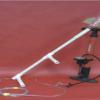
Handheld Water Bottle Rocket & Launcher
Source Institutions
In this activity, learners build handheld rockets and launchers out of PVC pipes and plastic bottles. Use this activity to demonstrate acceleration, air pressure, and Newton's Laws of Motion.
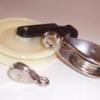
Pulleys and Force
Source Institutions
In this activity, learners explore the concept of force and how pulleys are used in everyday life to make work easier.
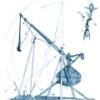
Trebuchet Toss
Source Institutions
In this activity, learners explore trebuchet design. Teams of learners construct trebuchets from everyday materials.
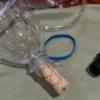
Water Rocket Launch
Source Institutions
In this activity, learners explore rocketry and the principals of space flight.
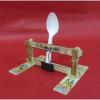
Catapult
Source Institutions
In this activity, learners build mini catapults using paint paddles and a spoon. Use this activity to introduce learners to forces and projectile motion.
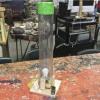
Wind Tube
Source Institutions
In this activity, learners explore moving air and the physics of lift and drag by constructing homemade wind tunnels.
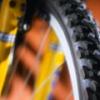
Give Me a Brake
Source Institutions
In this activity, learners explore the concept of how brakes can stop or slow mechanical motion.
